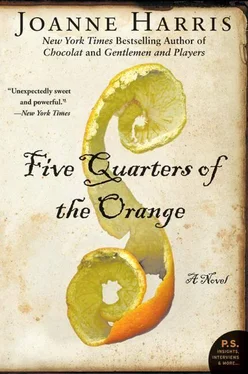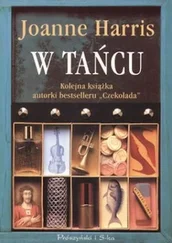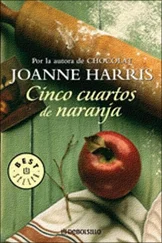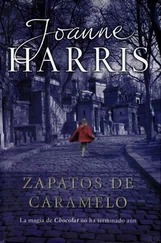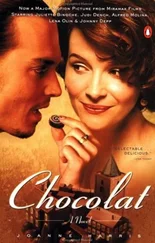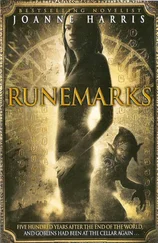Louis appeared to consider this. “Thank you, veuve Simon,” he said at last. “I think perhaps that would be for the best. At least until I can work out where to go from here.” He looked critically at Dessanges, who was pale now with something more than rage.
“You’re crazy, all three of you,” said Dessanges softly.
“Course, I’ll have to search you first,” said Louis calmly. “Can’t have you burning the place down or anything. Could you empty your pockets for me, please?”
Luc shook his head. “I just don’t believe this,” he said.
“I’m sorry sir,” persisted Louis. “But I’ll have to ask you to empty your pockets.”
“Ask away,” retorted Luc sourly. I don’t know what you’re expecting to get from all this, but when my lawyer hears about it…“
“I’ll do it,” suggested Paul. “I don’t suppose he can reach his pockets with his hands cuffed, anyway.”
He moved quickly, in spite of his seeming clumsiness, his poacher’s hands patting Luc’s clothing and abstracting its contents-a lighter, some rolling papers, car keys, a wallet, a packet of cigarettes. Luc struggled uselessly, swearing. He looked about him, as if expecting to see someone to whom he might call for help, but the street was deserted.
“One wallet.” Louis checked the contents. “One cigarette lighter. Silver. One mobile phone.” He began to open the packet of cigarettes and to shake out the contents into his palm.
Then, on Louis’s hand, I saw something I didn’t recognize. A small irregular block of some blackish brown stuff like old treacle toffee.
“I wonder what this is,” said Louis blandly.
“Fuck you!” said Luc sharply. “This isn’t mine! You planted it on me, you old bastard!”-this to Paul, who looked at him in slow-witted surprise. “You’ll never get it to stand-”
“Maybe not,” said Louis indifferently. “But we can try, can’t we?”
Louis left Dessanges in the root cellar as promised. He could keep him for twenty-four hours, he told us, before he had to charge him. With a curious glance at both of us and a careful lack of expression in his voice, he informed us that we had that time in which to conclude our business. A good lad, Louis Ramondin, in spite of his slowness. Too like his uncle Guilherm for comfort, though, and that I suppose blinded me at first to his essential goodness. I only hoped he’d not have cause to regret it soon enough.
At first Dessanges raved and yelled in the root cellar. Demanded his lawyer, his phone, his sister Laure, his cigarettes. Claimed his nose hurt, that it was broken, that for all he knew there were bone shards working their way into his brain right now. He hammered against the door, pleaded, threatened, swore. We ignored him, and eventually the sounds ceased. At twelve thirty I brought him some coffee and a plate of bread and charcuterie and he was sulky but calm, the look of calculation back in his eyes.
“You’re just delaying the moment, Mamie ,” he told me as I cut the bread into slices. “Twenty-four hours is all you’ve got, because as you know, as soon as I make that phone call-”
“Do you actually want this food?” I snapped at him sharply. “‘Cause it won’t hurt you to go hungry for a while, and that way I wouldn’t have to listen to your nasty talk any more. Right?”
He gave me a dirty look, but said nothing else on the subject.
“Right,” I said.
Paul and I pretended to work for the rest of the afternoon. It was a Sunday, and the restaurant was shut, but there was still work to be done in the orchard and in the vegetable garden. I hoed and pruned and weeded until my kidneys felt like hot glass and sweat ringed my armpits. Paul watched me from the house, not knowing I was also watching him.
Those twenty-four hours. They itched and fretted at me like a bad case of nettle rash. I knew I should be doing something , but what I could do in twenty-four hours was beyond my ability to decide. We had foiled one Dessanges-temporarily, at least-but the other was still as free and full of malice as ever. And time was short. Several times I even made it to the phone booth in front of the post office-manufacturing errands just so I could be near it, once even going as far as dialing the number but cutting it off before anyone answered as I realized I had absolutely no idea of what I ought to say. It seemed that wherever I looked I saw the same terrible truth staring out at me, the same terrible set of alternatives. Old Mother, with her mouth open and bristling with fishhooks, her eyes glassy with rage, myself pulling against that dreadful pressure, biting against it like a minnow on a line, as if the pike were some part of myself I was struggling to tear free, some black part of my own heart writhing and thrashing on the line, some terrible, secret catch…
It came down to one of two options. My mind might play with other possibilities-that Laure Dessanges might promise to leave me alone in exchange for her little brother’s release-but the deep-down practical part of my mind knew that they wouldn’t work. We’d only gained one thing by our actions so far-time-and I could feel the prize slipping from me second by second even as I racked my brains to find out how I could use it. If not, by the end of the week Luc’s prediction- your sad little secret is going to be splashed across every magazine, every newspaper -would stand before us in hard print, and I’d lose everything; the farm, the restaurant, my place in Les Laveuses… The only alternative, I knew, was to use the truth as a weapon. But although that might win me back my home and my business, who could say what the effect might be on Pistache, on Noisette, on Paul?
I gritted my teeth in frustration. No one should have to make that choice, I wailed inwardly. No one.
I hoed at a line of shallots so hard and so blindly that I forgot myself and began to gouge at the ripening plants, sending the shiny little onions flying with the weeds. I wiped sweat from my eyes and found I was crying.
No one should have to choose between a life and a lie. And yet she had, Mirabelle Dartigen, the woman in the picture with her fake pearls and shy smile, the woman with the sharp cheekbones and scragged-back hair. She’d given it up-all of it, the farm, the orchard, the little niche she had carved for herself, her grief, the truth-buried it without a backward glance and moved on… Only one fact is missing from her album, so carefully collated and cross-referenced, one thing she couldn’t possibly have written because she couldn’t possibly have known. One fact remains to complete our story. One fact.
If it wasn’t for my daughters and for Paul, I told myself, I’d tell all of it. If only to spite Laure, if only to rob her of her triumph. But there Paul was, so quiet and unassuming, so humble in his silence that he had managed to get past my defenses before I even realized it. Paul, always something of a joke with his stammer and his ratty old blue dungarees, Paul with his poacher’s hands and his easy smile. Who would have thought it would be Paul, after all these years? Who would have thought that after so many years I would find my way back home?
I almost phoned several times. Mirabelle Dartigen was long dead, after all. I had no need to haul her about the weird water of my heart like Old Mother on her line. A second lie would not change her now, I told myself. Nor would revealing the truth at this point allow me to atone. But Mirabelle Dartigen is a stubborn woman even in death. Even now I can feel her- hear her, like the wail of wires on a windy day-that shrill, confused treble which is all that remains of my memory of her. No matter that I never knew how much I really loved her. Her love, that flawed and stony secret, drags me with it into the murk.
Читать дальше
